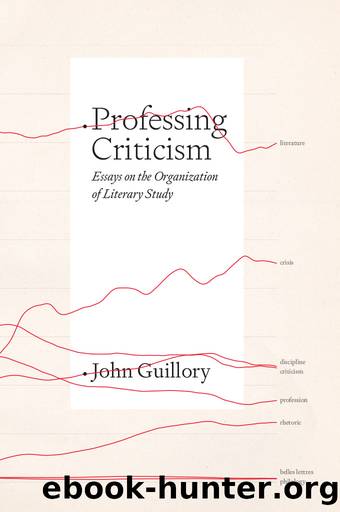Professing Criticism by John Guillory

Author:John Guillory [Guillory, John]
Language: eng
Format: epub
Tags: LIT000000 LITERARY CRITICISM / General, LIT006000 LITERARY CRITICISM / Semiotics & Theory, EDU015000 EDUCATION / Schools / Levels / Higher
Publisher: University of Chicago Press
Published: 2023-01-06T00:00:00+00:00
Professions
The question of numbers has been at the center of this analysis, most conspicuously greater numbers of graduate students and job applicants and lesser numbers of jobs. The disparity between these numbers constitutes the condition of âcrisis.â If we were to look at graduate education in the period before the 1970s, numbers tell a different story: we would see a very much smaller aggregate number of doctoral students than today. Students in one graduate program would be relatively isolated from students in others. There was no email, texting, social media, or internet blogging to establish lines of communication between students in far-flung institutions. The experience of being a graduate student was highly variable, more or less determined by the distinguishing features of oneâs graduate program, the chance constitution of oneâs student cohort, and above all, the interests and idiosyncrasies of oneâs teachers. By contrast, the reality of graduate education today is that the population of students constitutes a national and even international corps. Students are connected with each other by all the technical means just enumerated but also by new associational forms, such as the graduate student conference. These new forms have transformed the aggregate population of graduate students into a distinct culture, which I described at the beginning of this essay as a âsemiautonomous professional sphere.â
In âPreprofessionalism,â I attempted to describe this culture, though with limited success.32 I did not at the time have a sense of the difference technology would make in the cultural life of graduate students, as this technology was only just coming into common use. None of us could foresee in the 1990s how transformative the technology would be, both for social life generally and for graduate school in particular. I have no desire to celebrate or lament the technology itself, which is by many orders too complex and too diverse in its effects to characterize as good or bad. I return here to some of the questions raised by my earlier essays on graduate education in order to attempt again a description of the culture of graduate education in the wake of the collapsed job market and the emergence of a transinstitutional corps of graduate students.
The members of this corps are âpreprofessionalâ in the simple sense of not yet being hired to tenure-track jobs, whether or not the term âpreprofessionalismâ still applies in any other sense. From our later vantage, the question of whether or not graduate students should or will engage in activities that are identical to those of their professors is moot. Most incoming doctoral students already know quite a lot about professional activity in literary study and want to engage immediately in these activities.33 In fact, undergraduates were becoming much more informed about the professional aspects of graduate study already by the early 2000s. One graduate student commentator on my earlier essay, Craig Ferhman, writing in 2009, called attention to what he termed âpre-preprofessionalism,â by which he meant that many seniors applying to graduate school had thoroughly internalized the norms of
Download
This site does not store any files on its server. We only index and link to content provided by other sites. Please contact the content providers to delete copyright contents if any and email us, we'll remove relevant links or contents immediately.
Harry Potter and the Goblet Of Fire by J.K. Rowling(3040)
Unfinished: A Memoir by Priyanka Chopra Jonas(2915)
Never by Ken Follett(2879)
The Man Who Died Twice by Richard Osman(2297)
Machine Learning at Scale with H2O by Gregory Keys | David Whiting(2287)
Fairy Tale by Stephen King(2066)
Will by Will Smith(2040)
Rationality by Steven Pinker(1764)
The Storyteller by Dave Grohl(1659)
The Dawn of Everything: A New History of Humanity by David Graeber & David Wengrow(1570)
The Dark Hours by Michael Connelly(1569)
The Stranger in the Lifeboat by Mitch Albom(1532)
Cloud Cuckoo Land by Anthony Doerr(1434)
The Becoming by Nora Roberts(1330)
Friends, Lovers, and the Big Terrible Thing by Matthew Perry(1327)
New Morning Mercies: A Daily Gospel Devotional by Paul David Tripp(1320)
Einstein: His Life and Universe by Walter Isaacson(1314)
Crying in H Mart by Michelle Zauner(1314)
A Short History of War by Jeremy Black(1299)
